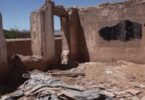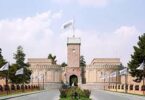MAIMANA (Pajhwok): Health workers in northwestern Faryab province complain they have not been paid their salaries for the last five months. If the issue is not addressed, they have warned of quitting their jobs. They also expressed concern over the suspension of assistance from the World Bank to Afghanistan’s health sector, which had vastly improved in the last two decades.
Dr. Hashmatullah Faizi, a Maimana Civil Hospital employee, told Pajhwok Afghan News all health workers continued to discharge their duties, but had not received salaries for the last five months. He termed cut of World Bank’s assistance as a matter of regret and said that humanitarian assistance should not be stopped to the war devastated Afghans. A disaster is possible if they do not reconsider their policies, he said.
Meanwhile, Sayed Ehsanullah, finance manager in Maimana Civil Hospital also said that they did not receive their salaries since the last five months and assistance from the World Bank has been stopped. He said that suspension of assistance from the World Bank affected all the health sector and healthcare centers would possibly shut if the situation continued.
Dr. Fawzia Salimi, the hospital director, said no major changes had been brought to the health sector in the wake of the Taliban’s takeover. Health personnel, 45 percent of them women, were regularly discharging their duties, said the official, who also headed hospital in the previous government. Salimi said she had not seen mistreatment of women at the hospital at the hands of the Taliban.
She confirmed health workers had been going without salaries over the past five months. The hospital chief warned of a public health catastrophe if the international community stopped aid to Afghanistan. Health workers, if not paid, could quit, she believed, explaining the hospital could not meet the needs of Faryab residents.
Former president Ashraf Ghani had funds for expanding the hospital to 300 beds. But the plan has not been implemented over the last two years for unknown reasons. Local officials say they are doing all they can to resolve health workers’ problems as soon as possible. Public Health Director Maulvi Khan Mohammad Himmat said there were 69 healthcare centers in the province, with 900 personnel, including 45 percent women. Their salaries are paid by the World Bank based on the Solidarity for Afghan Families (SAF) contract.
He called the suspension of World Bank assistance a bad move, saying health services continued as normal. But the halt to aid had sparked concerns among people and health workers, he added. The Ministry of Public Health was negotiating with the World Health Organization (WHO) the resumption of assistance.
If international assistance did not resume, the official said, the government would fund the health sector with its own resources. Dr. Mohammad Naeem, SAF head in Afghanistan, said the health sector was faced with problems in all 34 provinces of the country.
He said the International Monetary Fund (IMF) had promised funding health services for a month in Afghanistan through UNDP. Negotiations with donors, including WHO, World Bank and others, were underway to resolve the problem and prevent the collapse of the heath sector, he added. Naeem said salaries were previously paid by the Sanayee Development Organisation (SDO), a responsibility it had to discharge until July. SAF is responsible for paying salaries after that date.
Meanwhile, Afghanistan is now faced with medicine shortage due to disrupted border crossings and limited operation of banks. Almost all medicine in Afghanistan is imported from neighboring countries, such as Pakistan, India, Bangladesh, Iran and Turkey.
However, the border crossings between Afghanistan and its neighbors were disrupted in the lead-up to the Islamic Emirate of Afghanistan’s (IEA) takeover, and normal operations are yet to resume. Worse still, wholesalers have been unable to complete transactions due to the limited operation of banks.
“Yes, since the takeover, banks are closed [for international transactions]. As the banks are closed, we can’t transfer payments to suppliers. If we don’t transfer money to the suppliers legally, they will not be able to deliver us the medicine and prices will definitely rise. When demand is high, and supply is low, the prices naturally go up. We are facing a shortage in supply of essential medicine,” said Rohullah Alokozay, President of GPS Pharma, Reuters reported. Officials said the number of visitors at government hospitals has increased since the change of regime. The good news is that international donors have increased their focus towards government hospitals.
“In fact, we have even more visiting patients. Fortunately, we got more attention from UNICEF and the WHO, especially, towards our hospital which is a children’s hospital. They didn’t have enough focus in the last few years, but in the last month they increased our medical supply,” said Noor ul Haq Yousufzai, president of Indira Gandhi Institute for Children’s Health. In fact, the government hospitals didn’t have enough medical facilities in the past three to four years due to lengthy procurement processes and the problem of corruption.
Government hospitals were not able to provide medicines to patients despite the continued funding in the previous regime. “On one hand, prices have increased, while on the other hand, the people have become poorer. This has affected the doctors, patients and the society. Even in the former regime, patients used to buy their medicine at the market. We used to prescribe the medicine. Patients were not provided even with a single pill from the hospital,” said Dr. M. Fayaz Safi, Head of Medical Doctors’ Association in Afghanistan.
Many of the problems in the health sector have been left over from the previous regime. Wahid Majrooh, former acting minister of public health in the previous government said the former Afghan authorities had tried to solve the issues in coordination with stakeholders, but efforts were unsuccessful. “And it led us to having few or no supplies, and most of our health facilities including essential medicine, fuel, oxygen, staff salary. We have been trying to work with different stakeholders to see if we can fulfil the urgent needs, but we haven’t been able to do it successfully,” said Majrooh.






